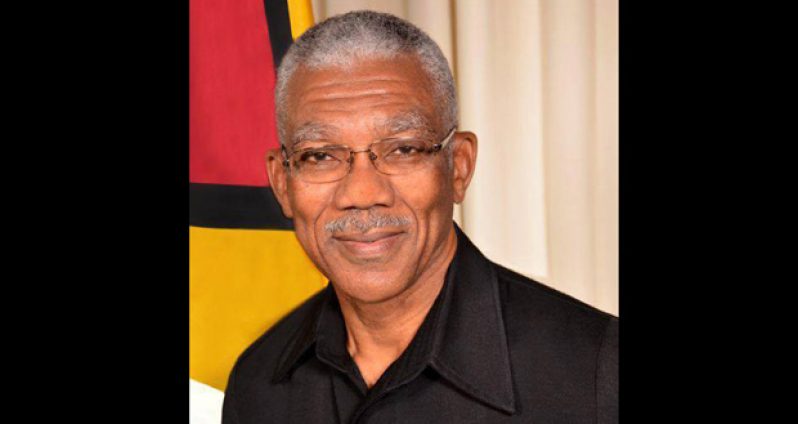By Fareeza Haniff
THE best defence against Venezuela’s aggression is a united people, President David Granger has said, confident that Guyanese are not willing to give up even “a blade of grass.”Granger, speaking on his weekly programme “The Public Interest,” said a united Guyana is becoming more evident, and this is a strong message to Venezuela.
“The best defence against Venezuela and the territorial claim is a united people and this is being achieved to a great extent now that we’re going to celebrate our 50th anniversary of independence.
“The Venezuelans can look to Guyana and see that our people have no intention of giving up, literally, a blade of glass,” President Granger said.
Guyana continues to make its case to the international community against acts of aggression by Venezuela under President Nicolas Maduro’s decree, which lays claim to Guyana’s Essequibo region, as well as the maritime space off Guyana’s Atlantic coast.
Guyana has made it clear that the Good Offices process of mediating the border controversy between the two countries has run its course and the next best option is a juridical settlement by the International Court of Justice (ICJ) with the assistance of the United Nations (UN).
As such, President Granger met last week with Secretary-General of the United Nations Ban Ki-moon, where he emphasised “that after 50 years, the Guyanese people are united and they are determined to maintain territorial integrity.”
“The Venezuelans can look to Guyana and see that our people have no intention of giving up, literally, a blade of glass.” – President Granger
Confidence in Ban
The President expressed his confidence in the Secretary-General, who is preparing to demit office this year, to select the best course of action, which would finally resolve the controversy via a juridical process.
“I do feel that Secretary-General Ban Ki -moon is fully engaged; he is aware of the various elements in our territorial controversy and this is his last year in office and we would like to ask that he uses his remaining time to ensure that the responsibility which he has under the Geneva Agreement are actually implemented; that is to say, after consultations with both Caracas and Georgetown, he can select a course of action and that course that we have recommended is a juridical course,” the Head of State said.
He further noted, “So I am very confident that while he is in office, he is going to discharge his responsibility under the Geneva Agreement and also under the Charter of the United Nations.”
Meanwhile, as an immediate measure to resolve the controversy, the President explained that the Secretary-General intends to send a fact-finding team to Caracas, which would also visit Guyana.
“So that is the immediate step to satisfy himself that both countries would like to move the process forward. There is little we could do; we would wait patiently on the Secretary-General to select a course of action and once that course of action is selected, we will be ready to move ahead to go to court,” the President said.
It was on the eve of Guyana’s independence some five decades ago that Venezuela claimed the 1899 arbitral award which defined the two countries’ borders was null and void. An agreement signed in Geneva in 1966 provides for the Secretary-General to take action to bring a resolution to the contention by Venezuela.
“…we would wait patiently on the (UN) Secretary-General to select a course of action and once that course of action is selected, we will be ready to move ahead to go to court.”
Guyana has accused Venezuela of a series of acts of aggression, starting with a presidential decree of June 1968. The border controversy flared early last year when American firm ExxonMobil announced that it had made a “significant” oil discovery.
After threatening the company, the Venezuelan President Nicolás Maduro issued a decree on May 26th last year, seeking to extend Venezuela’s land claim to also annex the country’s maritime space.
Two years ago the Venezuelans sent a naval ship into Guyanese waters and seized a U.S.-chartered oil survey ship and escorted it to Margarita Island.
In September last year, Guyanese authorities also said the Venezuela army was up the Cuyuni River.
Also, in late October last year, Canada-based mining company Guyana Goldfields said it had received an “unfounded” notification of possible legal action by Venezuela over its operations in Guyana.



.jpg)









